Trigger warning: Mentions of rape, acid attacks
It took me a day or two to catch up with the second season of the popular Indian TV series The Family Man. While I was preparing for the resolution of the cliffhanger of the previous season, I noticed a number of memes regarding the characters of Suchitra and Dhriti, respectively the protagonist Srikant Tiwari‘s wife and daughter. The sudden emergence of memes and critiques of these characters can be summarised in a sentence, that the presence of these two women in anyone’s life would make their lives miserable. I wondered what they might have done, until last night I sat down to binge watch and I found my answer.
Among the problematic aspects of the The Family Man season 2, the portrayal of Suchi and Dhriti in the script echoes “the problem with our patriarchal society, with its deep-rooted misogyny”. The directors have embedded their characters with features that are designed and formulated in a way that people get furious and repellent of them.
Among the problematic aspects of the The Family Man season 2, the portrayal of Suchi and Dhriti in the script echoes “the problem with our patriarchal society, with its deep-rooted misogyny”. The directors have embedded their characters with features that are designed and formulated in a way that people get furious and repellent of them. It is related to the larger societal front where it is accepted and considered that a natural family must function submissively under a man. The characters are written to be received in the way they are being received currently.
Also read: Film Review: Karnan — Humanising The ‘Other’
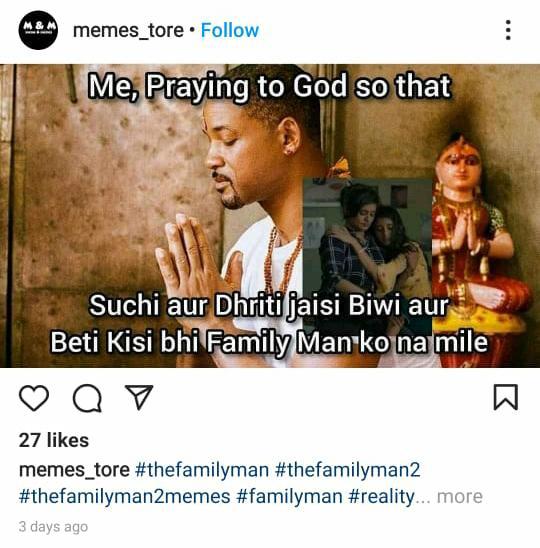
So where does Suchi go wrong? The recent articles and memes are bashing her left and right for being unfaithful to her husband. God forbid a woman being open about how unhappy she is in her marriage. Why do we as a society collectively enable women being denied their conscience? Conscience that she demands something different in her life, that she is tired of catering to a man who has never been present in the marriage. And suddenly that he is making an effort to make it right, which goes south real soon with their couple’s therapy, is lauded for doing the fundamental duties that a partner and father must engage with anyway.

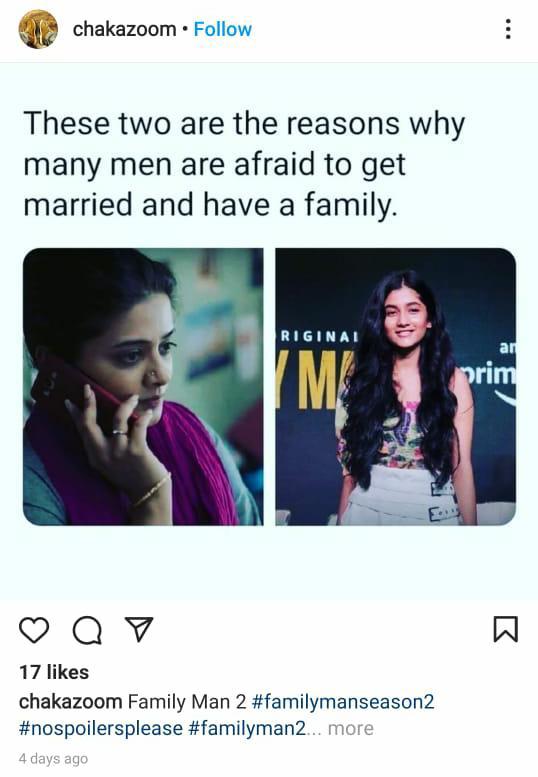
Srikant‘s vocation here is a dicey one, he cannot do more even if he wishes to, yet his efforts to compensate for his absence is acknowledged. His romance with an old flame Saloni in the previous season is considered harmless, him creepily checking Suchi‘s phone, and stalking and tracing it to eavesdrop into her meeting with Arvind is somehow comically justified. Even the character of Nanda, Raji‘s employer, who goes on to seduce, manipulate and ultimately threaten Raji into sleeping with him is not facing the minimum amount of backlash. Pondered why?
A man looking outside of his marriage for an affair has long been normalised. Men have needs. While a woman who is upset with her husband’s constant absence, trying to engage with another man is filthy, loathsome and according to some comments, even deserves to be thrown acid at. She is the successor of Skylar White and Hannah Kahnwald.
Where is Suchi‘s agency in The Family Man? Sometimes you may love your partner and your children, and still be unhappy. Emotions are not concrete, especially when you are expected to be a docile, submissive, faithful wife and sacrificing mother for so long. It simply affirms the notion that a married woman with children has no life of her own. Have we forgotten the recent viral image of a mother who was preparing dinner for her family in an oxygen mask? Where familial values and motherhood is worshipped, the burden of it seems invisible.
Again, we saw that Suchi is flourishing in her new job, which denotes us of her capability. However, she is scared to move out and venture into a new turn in her career and she thinks she needs her husband’s permission to do so, which is why she asks him. In reply, Srikant asks her what is wrong with the old teaching job which seems suitable for a woman, and if she comes home late, who would look after their children. She’s accountable to him regarding her career, whereas he hides his job and his whereabouts. Hiding his job is not a problem, but putting her in a box while prioritising his own is. Because Suchi‘s work doesn’t involve guns, terrorists, hyper-nationalism or anyone’s life at stake, it is somehow inferior. She has her own challenges and the biggest of all is not being able to communicate with the father of her children and a partner of 16 years.
Coming to Dhriti, her arrogance and childish decisions lead to her fall, or that is what the writers are displaying her as, opposing the norm of ‘angel in the house’. She seeks Srikant‘s presence in life but defies the typical ‘daddy’s little angel’. She is pictured as a teenager without hobbies such as music or craft, but as only meeting her boyfriend after school and lying to her parents. She is a teenager exploring romance and her sexuality. Of course, the makers think it best to depict her as a ‘bad girl’.
These actions culminate into a massive shadow, beyond which the audience cannot see her awareness and progressive views. She is villainised for she has access to knowledge and she questions regressive structures. The narration that a feminist is ‘over-smart’ and is doomed to be a damsel in distress waiting to be rescued by a male figure, could not have been more predictable. She barely has any friends because of ‘ideological differences’ as her classmate suggests and she calls out people for their ignorant opinions. The angle of love jihad in The Family Man, is such lazy writing with absolutely no nuances.
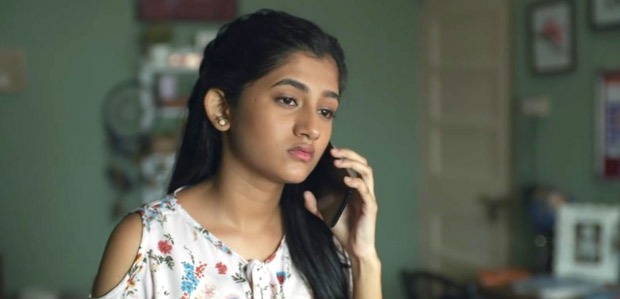
A Muslim guy sweeps her off her feet and she is fooled by him which eventually leads her to a life-threatening situation. It does not make sense how, despite being so clever, alert and bold she fell into a trap that was so obvious. Was she not aware of Kalyan/Salman‘s background, his education, his family at all? Could she not trace the clues when a shopkeeper calls his real name out or when she visited his uncle’s house and found something scribbled in Arabic on the wall? If demonising a feminist was not enough, they (the writers of The Family Man) choose to reduce her to someone unintelligent. Some triggering content on social media even suggest that she deserved to be tortured, and we wonder why we continue to blame the victims of abuse, molestation and rape for their choices.
These characters’ plot line in The Family Man stinks of the urge to box women into the category where “she never had a mind or a wish of her own, but preferred to sympathize always with the minds and wishes of others.” (Virginia Woolf, Professions For Women, 1931)
The ramification of catering to these dangerous stereotypes is women jeopardising their own lives if they are ‘modern’ and independent. These characters’ plot line in The Family Man stinks of the urge to box women into the category where “she never had a mind or a wish of her own, but preferred to sympathize always with the minds and wishes of others.” (Virginia Woolf, Professions For Women, 1931)
Also read: Tamil Refugee Women In India: The Unsung & Stateless Who Saved Their Families In Exile
Both the characters and the hatred generated towards them prove how the 21st century audience is still not ready to face or accept a wife who is seeking her agency despite being in a marriage and a daughter who has the audacity to question. These are the tropes of characters where either they are redeemed by showing that they were actually innocent, fooled by manipulation, or shown the fear of punishment where the male head of the family would decide the consequences of looking outside of marriage. By redeeming or punishing, the threat of women crossing the boundary is eliminated. At the end, they are muted in the show and ridiculed on the internet. It leaves me wondering how these popular shows impact the 21th century progressive India and cater to an audience who is ready for our protagonist, who is now free to endeavor towards a newer, more dangerous challenge and is applauded for his victory.
Joyshri Pathak is a Doctoral Candidate in the Department of English in Gauhati University, Guwahati. She holds a masters degree in the same subject from Tezpur University. Her research interests include gender politics, European literature, trauma and memory studies among others. She can be found on Instagram and Facebook.
Featured image source: Images as sourced by the author
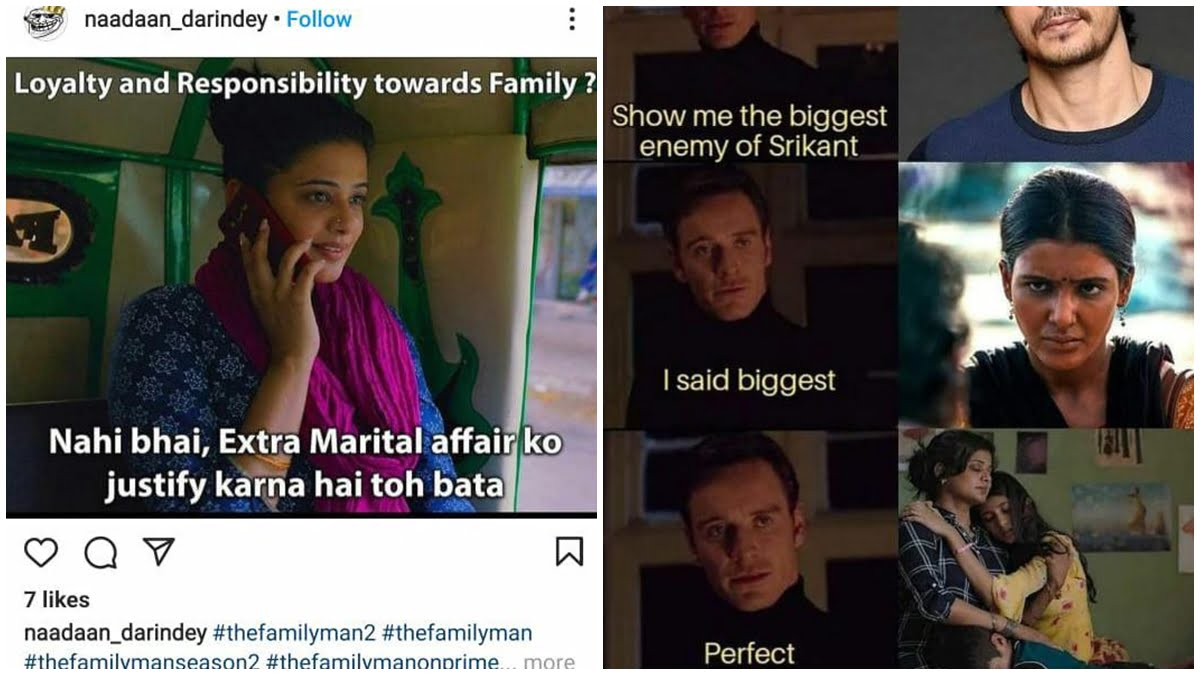
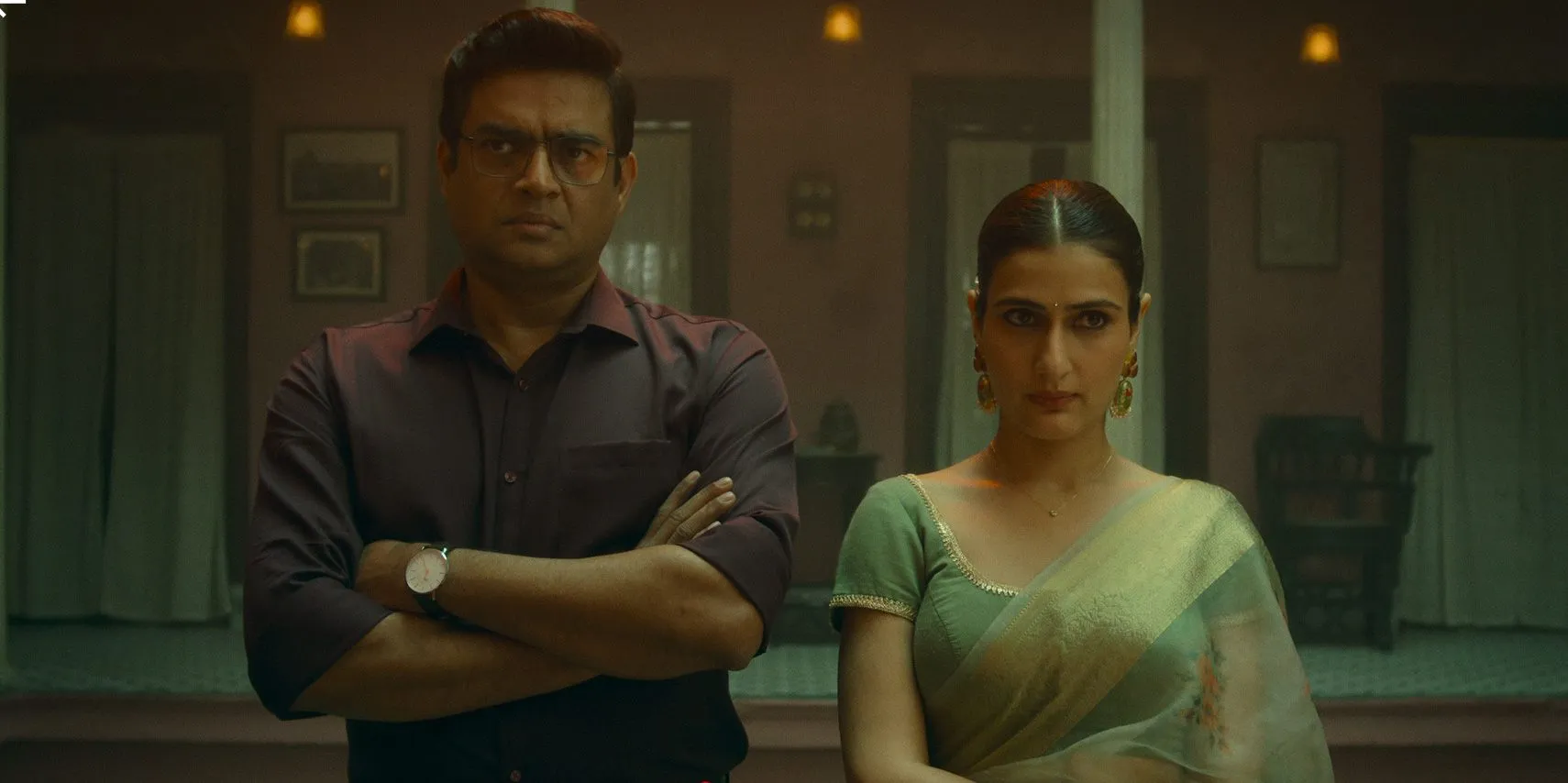



Rightly said. Even I was furious about the backlash they faced. I mean I get it, they made some mistakes but so did srikar. However whatever srikar did didn’t even crossed someone mind. The way they decided to potray the girl, having boyfriend, no care attitude, and at last assaulted as if it was justified being the “bad girl”. My parents themselves commented that this is the reason daughters should be kept in check. I mean, same things could’ve been done by a teen guy and still noone would’ve batteled an eye. I am really disappointed in the media and people too.
The truth is some people are always going to be offended by something or the other.The bottomline is this web series tried to break many stereotypes without going too far away from the reality.Every character has its own flaws and each and everyone of us would look at them from our point of view,giving leeway to one with which we co-relate ourselves.For time being let’s accept the fact that both Srikant and Suchi had their own shortcomings and their offspring Dhriti unwittingly became the victim of her parents oversight and lack of care.